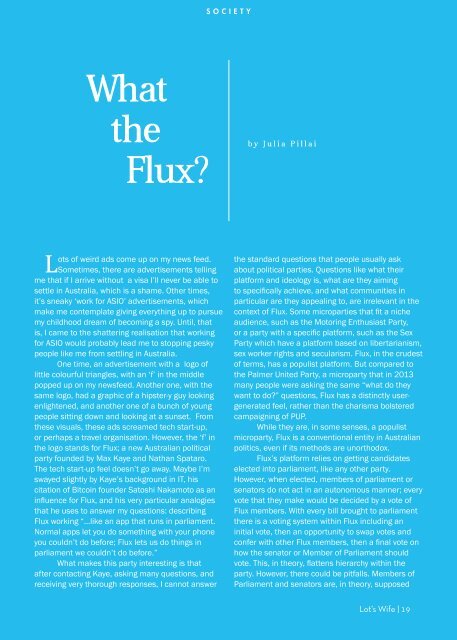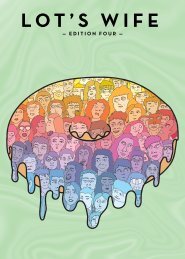Lot's Wife Edition 1 2016
You also want an ePaper? Increase the reach of your titles
YUMPU automatically turns print PDFs into web optimized ePapers that Google loves.
SOCIETY<br />
What<br />
the<br />
Flux?<br />
by Julia Pillai<br />
Lots of weird ads come up on my news feed.<br />
Sometimes, there are advertisements telling<br />
me that if I arrive without a visa I’ll never be able to<br />
settle in Australia, which is a shame. Other times,<br />
it’s sneaky ‘work for ASIO’ advertisements, which<br />
make me contemplate giving everything up to pursue<br />
my childhood dream of becoming a spy. Until, that<br />
is, I came to the shattering realisation that working<br />
for ASIO would probably lead me to stopping pesky<br />
people like me from settling in Australia.<br />
One time, an advertisement with a logo of<br />
little colourful triangles, with an ‘f’ in the middle<br />
popped up on my newsfeed. Another one, with the<br />
same logo, had a graphic of a hipster-y guy looking<br />
enlightened, and another one of a bunch of young<br />
people sitting down and looking at a sunset. From<br />
these visuals, these ads screamed tech start-up,<br />
or perhaps a travel organisation. However, the ‘f’ in<br />
the logo stands for Flux; a new Australian political<br />
party founded by Max Kaye and Nathan Spataro.<br />
The tech start-up feel doesn’t go away. Maybe I’m<br />
swayed slightly by Kaye’s background in IT, his<br />
citation of Bitcoin founder Satoshi Nakamoto as an<br />
influence for Flux, and his very particular analogies<br />
that he uses to answer my questions: describing<br />
Flux working “…like an app that runs in parliament.<br />
Normal apps let you do something with your phone<br />
you couldn’t do before; Flux lets us do things in<br />
parliament we couldn’t do before.”<br />
What makes this party interesting is that<br />
after contacting Kaye, asking many questions, and<br />
receiving very thorough responses, I cannot answer<br />
the standard questions that people usually ask<br />
about political parties. Questions like what their<br />
platform and ideology is, what are they aiming<br />
to specifically achieve, and what communities in<br />
particular are they appealing to, are irrelevant in the<br />
context of Flux. Some microparties that fit a niche<br />
audience, such as the Motoring Enthusiast Party,<br />
or a party with a specific platform, such as the Sex<br />
Party which have a platform based on libertarianism,<br />
sex worker rights and secularism. Flux, in the crudest<br />
of terms, has a populist platform. But compared to<br />
the Palmer United Party, a microparty that in 2013<br />
many people were asking the same “what do they<br />
want to do?” questions, Flux has a distinctly usergenerated<br />
feel, rather than the charisma bolstered<br />
campaigning of PUP.<br />
While they are, in some senses, a populist<br />
microparty, Flux is a conventional entity in Australian<br />
politics, even if its methods are unorthodox.<br />
Flux’s platform relies on getting candidates<br />
elected into parliament, like any other party.<br />
However, when elected, members of parliament or<br />
senators do not act in an autonomous manner; every<br />
vote that they make would be decided by a vote of<br />
Flux members. With every bill brought to parliament<br />
there is a voting system within Flux including an<br />
initial vote, then an opportunity to swap votes and<br />
confer with other Flux members, then a final vote on<br />
how the senator or Member of Parliament should<br />
vote. This, in theory, flattens hierarchy within the<br />
party. However, there could be pitfalls. Members of<br />
Parliament and senators are, in theory, supposed<br />
Lot’s <strong>Wife</strong> | 19

















